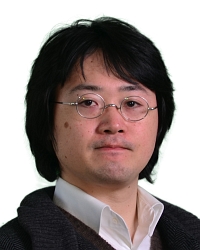TR2024-022
Implicit Neural Representation for Low-Overhead Graph-Based Holographic-Type Communications
-
- , "Implicit Neural Representation for Low-Overhead Graph-Based Holographic-Type Communications", IEEE International Conference on Acoustics, Speech, and Signal Processing (ICASSP), April 2024.BibTeX TR2024-022 PDF
- @inproceedings{Fujihashi2024apr,
- author = {Fujihashi, Takuya and Kato, Sorachi and Koike-Akino, Toshiaki},
- title = {Implicit Neural Representation for Low-Overhead Graph-Based Holographic-Type Communications},
- booktitle = {IEEE International Conference on Acoustics, Speech, and Signal Processing (ICASSP)},
- year = 2024,
- month = apr,
- url = {https://www.merl.com/publications/TR2024-022}
- }
- , "Implicit Neural Representation for Low-Overhead Graph-Based Holographic-Type Communications", IEEE International Conference on Acoustics, Speech, and Signal Processing (ICASSP), April 2024.
-
MERL Contact:
-
Research Areas:
Abstract:
Point cloud delivery over wireless and mobile channels will be a key technology for untethered users to realize extended reality via wire- less and mobile terminals. A key challenge of point cloud delivery is efficiently delivering the point cloud over unstable and band-limited channels. Graph Fourier Transform (GFT) is a potential solution to compress such non-uniformly and non-orderly distributed signals in a 3D space, whereas GFT-based solutions require large communication overhead to share the graph information with the receiver. This paper proposes a novel point cloud delivery scheme that introduces implicit neural representation (INR) to reduce the overhead. Specifically, the INR of the proposed scheme trains a mapping between the indices and the corresponding weight in the adjacency matrix and the proposed scheme sends the parameter set of the INR as the metadata. Evaluations demonstrate that the proposed scheme can improve the point cloud quality under the same amount of communication over- head because the proposed INR can predict most of the elements in the adjacency matrix using a small parameter set.
Related News & Events
-
EVENT MERL Contributes to ICASSP 2024 Date: Sunday, April 14, 2024 - Friday, April 19, 2024
Location: Seoul, South Korea
MERL Contacts: Petros T. Boufounos; François Germain; Chiori Hori; Sameer Khurana; Toshiaki Koike-Akino; Jonathan Le Roux; Hassan Mansour; Zexu Pan; Kieran Parsons; Joshua Rapp; Anthony Vetro; Pu (Perry) Wang; Gordon Wichern; Ryoma Yataka
Research Areas: Artificial Intelligence, Computational Sensing, Machine Learning, Robotics, Signal Processing, Speech & AudioBrief- MERL has made numerous contributions to both the organization and technical program of ICASSP 2024, which is being held in Seoul, Korea from April 14-19, 2024.
Sponsorship and Awards
MERL is proud to be a Bronze Patron of the conference and will participate in the student job fair on Thursday, April 18. Please join this session to learn more about employment opportunities at MERL, including openings for research scientists, post-docs, and interns.
MERL is pleased to be the sponsor of two IEEE Awards that will be presented at the conference. We congratulate Prof. Stéphane G. Mallat, the recipient of the 2024 IEEE Fourier Award for Signal Processing, and Prof. Keiichi Tokuda, the recipient of the 2024 IEEE James L. Flanagan Speech and Audio Processing Award.
Jonathan Le Roux, MERL Speech and Audio Senior Team Leader, will also be recognized during the Awards Ceremony for his recent elevation to IEEE Fellow.
Technical Program
MERL will present 13 papers in the main conference on a wide range of topics including automated audio captioning, speech separation, audio generative models, speech and sound synthesis, spatial audio reproduction, multimodal indoor monitoring, radar imaging, depth estimation, physics-informed machine learning, and integrated sensing and communications (ISAC). Three workshop papers have also been accepted for presentation on audio-visual speaker diarization, music source separation, and music generative models.
Perry Wang is the co-organizer of the Workshop on Signal Processing and Machine Learning Advances in Automotive Radars (SPLAR), held on Sunday, April 14. It features keynote talks from leaders in both academia and industry, peer-reviewed workshop papers, and lightning talks from ICASSP regular tracks on signal processing and machine learning for automotive radar and, more generally, radar perception.
Gordon Wichern will present an invited keynote talk on analyzing and interpreting audio deep learning models at the Workshop on Explainable Machine Learning for Speech and Audio (XAI-SA), held on Monday, April 15. He will also appear in a panel discussion on interpretable audio AI at the workshop.
Perry Wang also co-organizes a two-part special session on Next-Generation Wi-Fi Sensing (SS-L9 and SS-L13) which will be held on Thursday afternoon, April 18. The special session includes papers on PHY-layer oriented signal processing and data-driven deep learning advances, and supports upcoming 802.11bf WLAN Sensing Standardization activities.
Petros Boufounos is participating as a mentor in ICASSP’s Micro-Mentoring Experience Program (MiME).
About ICASSP
ICASSP is the flagship conference of the IEEE Signal Processing Society, and the world's largest and most comprehensive technical conference focused on the research advances and latest technological development in signal and information processing. The event attracts more than 3000 participants.
- MERL has made numerous contributions to both the organization and technical program of ICASSP 2024, which is being held in Seoul, Korea from April 14-19, 2024.
